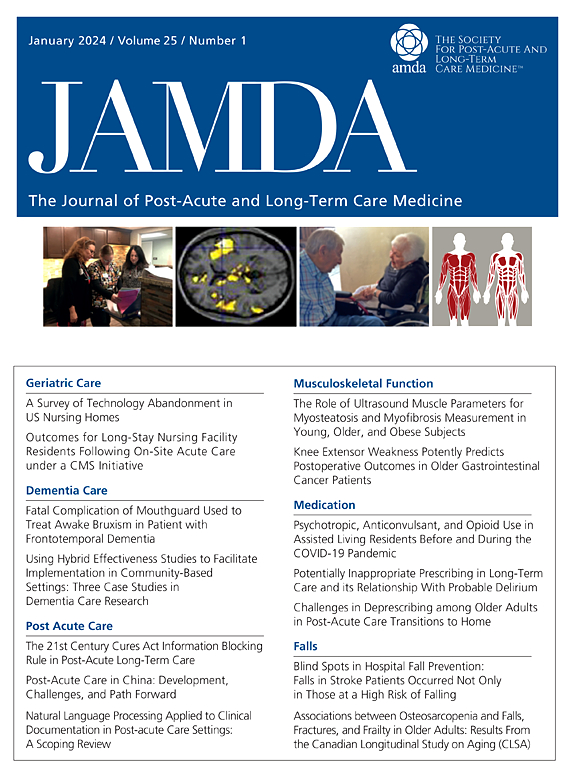Family Caregiver Availability and Capacity Associated With Home Health Service Types for Patients With Dementia
IF 4.2
2区 医学
Q2 GERIATRICS & GERONTOLOGY
Journal of the American Medical Directors Association
Pub Date : 2025-07-17
DOI:10.1016/j.jamda.2025.105744
引用次数: 0
Abstract
Objectives
To investigate the relationship between unmet needs for family caregiver support, defined as lack of caregiver availability or capacity, and home health care (HH) service types delivered to patients with dementia.
Design
Cross-sectional study of national claims and assessment data.
Setting and Participants
325,148 older adults (aged ≥65 years) with diagnosed dementia receiving Medicare-funded HH in 2018.
Methods
Service types were measured from Medicare claims and refers to patient receipt of each of 6 service types covered during HH: nursing, physical therapy, occupational therapy, speech therapy, social work, and personal care aide. We fit multivariable logistic regression models estimating the odds of receiving each service type as a function of unmet caregiving needs and patient and HH agency characteristics, while clustering at the HH agency level.
Results
In adjusted models, lack of caregiver availability to help with medical, functional, or instrumental tasks was associated with higher odds of receiving skilled nursing [adjusted odds ratio (aOR) 1.63, 95% CI 1.47-1.81], aide (aOR 1.61, 95% CI 1.54-1.68), and social work (aOR 2.71, 95% CI 2.56-2.86), respectively. Lack of caregiver capacity to help with medical, functional, or instrumental tasks was associated with higher odds of receiving skilled nursing (aOR 1.29, 95% CI1.20-1.39), physical therapy (aOR 1.74, 95% CI1.68-1.81), and social work (aOR 1.24, 95% CI 1.17-1.28), respectively.
Conclusions and Implications
We observed significant associations between unmet needs for caregiving support and HH service delivery for patients with dementia. Expanding HH quality measurement and risk adjustment data elements to include measures of caregiver availability and capacity are necessary steps toward supporting HH providers' efforts to meet patients’ needs regardless of their caregiving context.
与痴呆症患者家庭健康服务类型相关的家庭照顾者的可用性和能力。
目的:调查未满足的家庭照顾者支持需求(定义为缺乏照顾者可用性或能力)与提供给痴呆患者的家庭卫生保健(HH)服务类型之间的关系。设计:国家索赔和评估数据的横断面研究。背景和参与者:2018年325,148名诊断为痴呆症的老年人(年龄≥65岁)接受医疗保险资助的HH。方法:从医疗保险索赔中测量服务类型,并参考HH期间患者接受的6种服务类型:护理、物理治疗、职业治疗、语言治疗、社会工作和个人护理助理。我们拟合多变量逻辑回归模型,估计接受每种服务类型的几率作为未满足的护理需求和患者和HH代理特征的函数,同时在HH代理水平上聚类。结果:在调整后的模型中,缺乏护理人员帮助完成医疗、功能性或器质性任务与接受熟练护理(调整优势比(aOR) 1.63, 95% CI 1.47-1.81)、助手(aOR 1.61, 95% CI 1.54-1.68)和社会工作(aOR 2.71, 95% CI 2.56-2.86)的几率较高相关。缺乏护理人员帮助完成医疗、功能性或工具性任务的能力分别与接受熟练护理(aOR 1.29, 95% CI1.20-1.39)、物理治疗(aOR 1.74, 95% CI1.68-1.81)和社会工作(aOR 1.24, 95% CI 1.17-1.28)的几率较高相关。结论和意义:我们观察到痴呆患者未满足的护理支持需求与HH服务提供之间存在显著关联。扩大HH质量测量和风险调整数据元素,以包括护理人员可用性和能力的测量,是支持HH提供者努力满足患者需求的必要步骤,无论其护理背景如何。
本文章由计算机程序翻译,如有差异,请以英文原文为准。
求助全文
约1分钟内获得全文
求助全文
来源期刊
CiteScore
11.10
自引率
6.60%
发文量
472
审稿时长
44 days
期刊介绍:
JAMDA, the official journal of AMDA - The Society for Post-Acute and Long-Term Care Medicine, is a leading peer-reviewed publication that offers practical information and research geared towards healthcare professionals in the post-acute and long-term care fields. It is also a valuable resource for policy-makers, organizational leaders, educators, and advocates.
The journal provides essential information for various healthcare professionals such as medical directors, attending physicians, nurses, consultant pharmacists, geriatric psychiatrists, nurse practitioners, physician assistants, physical and occupational therapists, social workers, and others involved in providing, overseeing, and promoting quality

 求助内容:
求助内容: 应助结果提醒方式:
应助结果提醒方式:


